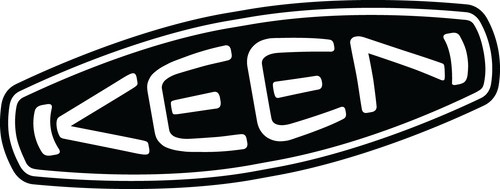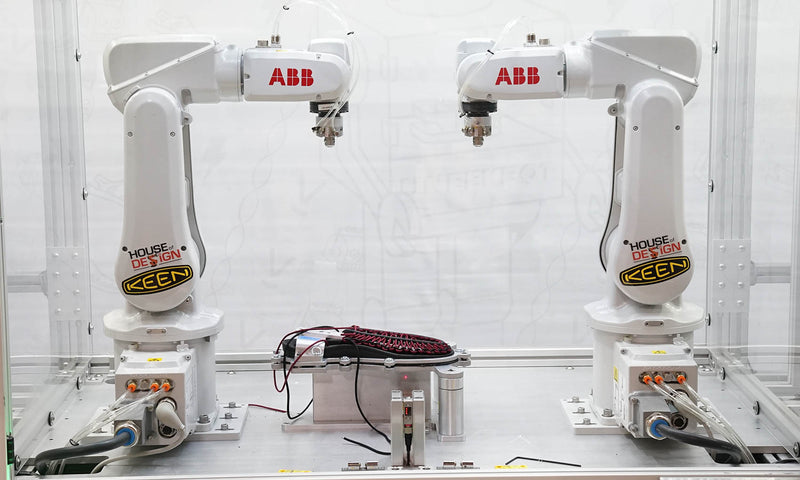One of the benefits of building the World’s Smallest Shoe Factory is that it’s the perfect size to take on the road.
So that’s just what we did. On April 6, we loaded up the KEEN trailer with our revolutionary UNEEKBOT shoemaking robot for a U.S. tour. Our destination? Design, engineering, and business schools around the country to meet with the next generation of innovators.
With two robotic arms that can create made-to-order UNEEK sandals right on the spot, UNEEKBOT is a programming wonder—and it all started with a typical question among innovators: “What if?”
I’VE SPENT TENS OF THOUSANDS OF HOURS DOING THIS THING THAT PEOPLE SAID WAS IMPOSSIBLE AND WAS NEVER GOING TO WORK.
“UNEEK is this puzzle that we wanted to figure out,” says Rory Fuerst, Jr., Director of Innovation at KEEN. “It’s been seven years of my 33-year-old life. I’ve spent tens of thousands of hours doing this thing that people said was impossible and was never going to work.”

INNOVATING UNEEK
On its own, his design of a shoe with two cords and a sole revolutionised the shoemaking process. As Rory says laughing, “We got kicked out of factories,” because the sandal's cord-based, upper-making process was so different. Creating that shoe with a robot only added to the perceived impossibility of it. But Rory says that was the goal from the beginning.

“We said, ‘If we had to do this with a robot, how would we do it?’ And if you look at UNEEK, all it is is a repeatable pattern,” he says. “It’s two loops stacked on top of each other, repeated 37 times in a size 9.”
That repeatability made it a great candidate for robotics. Still, when KEEN took the idea to different engineering companies, they said it was too hard for robots to do that. House of Design Robotics, based in Nampa, Idaho, was eager to take on the challenge and worked with Rory and team to make it happen.

“It’s all math at the end of the day,” he says. “Everything is just points in space. So that’s how UNEEK works. The code dictates where those points in space are, and that's what sets the loop lengths in UNEEK's cord design. Tweak the points to change the fit or accommodate a new material, and the loop length changes. The key is understanding how the code applies to real life and the interconnectedness of the cords. If you're adding loops, you have to know what you're taking out somewhere else."
At one point UNEEKBOT had 576 points to do the bottom half of the shoe (through re-engineering, it's closer to 100 now). In comparison, Rory says that most industrial robot systems often will have less than 10 points. That’s how intense the coding—and, more specifically, translating the coding—is. Plus, each shoe size, gender, and right and left shoe needs to have its own slightly different code.
“Trying to manipulate soft materials and control them is the hardest thing in the world,” he explains, adding that cord elasticity also factors into the complexity. “Even a slight variance in stretch—as little as two percent—could lead to a robot crash.”

UNEEKBOT has been fully operational since the summer of 2017, when it first launched in Tokyo. Yet the team is continually tweaking the code to make adjustments, and the process is constantly evolving to try to make it go faster. But by and large they’ve got it down to a science: it can take as little as 25 minutes to build an original UNEEK sandal and closer to 20 minutes for the UNEEK slide. The UNEEKBOT itself does the bulk of the work, weaving the upper of the UNEEK slide in under six minutes, and then the bot’s human counterparts do the finishing work.
TAKING UNEEKBOT ON THE ROAD
It’s that speed that makes it a great road trip companion, along with its portable size. People want stuff fast, and being able to give them shoes on the spot is a huge feat in itself.
TO MAKE A SHOE IN 25 MINUTES IN AN URBAN AREA, IN THIS KIND OF SETTING WITH A SHOE THIS COMPLEX, IS ABSOLUTELY UNHEARD OF. FOR THE ORIGINAL UNEEK SANDAL, MY GOAL IS FOR YOU TO COME IN, ORDER YOUR UNEEK, ORDER A COFFEE, DRINK YOUR COFFEE, AND WALK OUT WITH YOUR SHOES.
“To make a shoe in 25 minutes in an urban area, in this kind of setting with a shoe this complex, is absolutely unheard of. For the original UNEEK sandal, my goal is for you to come in, order your UNEEK, order a coffee, drink your coffee, and walk out with your shoes." Rory says, laughing, "And we are talking about a nice, hot coffee—we still need a bit of time."

As Rory’s UNEEKBOT journey continues, his passion is just the kind of never-give-up, innovative spirit that the KEEN Innovation Team hopes to inspire and connect with while meeting with the next generation of innovators. As part of the campus tour, students will submit their innovation ideas for a chance to win grant money.
“I cannot stress enough that if you really want to do something different, you have to be really, really different. And you have to be OK with that. I think that’s something that people who are studying and preparing to get into this need to understand,” Rory says.
It starts with you being you. And, frankly, that’s what the UNEEK sandal is all about.








